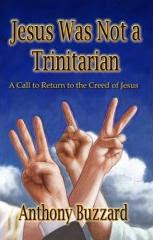
I have a copy of Is God a Trinity? on file, published by the WCG way back when. In those distant times there was little doubt about the answer: no!
But times have changed, and what appears to be the first booklet published under the GCI brand is titled A Brief Introduction to Trinitarian Theology.
This time round they're not even bothering to ask the question.
The kind of trinitarianism GCI promotes isn't the standard version you'd find in Catholic, Lutheran and Orthodox communions, but a variety pickled with the MSG of junk theology, marketed under the labels "Barth" and "Reformed," and produced in porridge vats with the patented perichoresis ingredient by Baxter Kruger, the terrible Torrances, and their ilk. Perichoresis, you ask? How to put this delicately... God (to quote Wikipedia) enjoys "mutual interpenetration."
This particular concoction has universalist dimensions, so much so that the booklet even asks the rhetorical question Isn't this universalism? and consciously distances itself from bog Calvinism. Well, that's commendable I guess, but the fact remains that it stills build on a Calvinist foundation (as does Arminianism - which can only make sense as a reaction to Calvinism.) You buy a cheap Ford, strip it down and soup the coupe... is it still a Ford?
Well, it sure ain't a BMW.
Who's the author? There's no attribution in the online edition; GCI seems to be using the same anonymity policy as the Watchtower Bible & Tract Society. Part 1 sets out the case, and part 2 is a kind of "catechism" that rehearses possible questions. If you reside in the USA, Joe & Co. will graciously send you a free copy. If you live elsewhere, you'll need to read it online.


